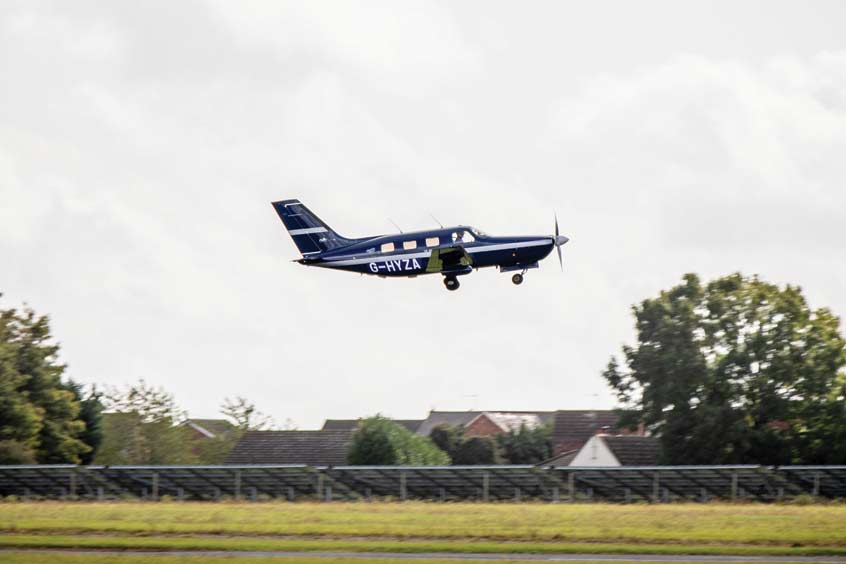Why visit ACE ’25?

ZeroAvia has completed the world's first hydrogen fuel cell-powered flight of a commercial-grade aircraft. The flight recently took place at the company's R&D facility in Cranfield, England, with the Piper M-class six-seat plane completing taxi, takeoff, a full pattern circuit and landing.
ZeroAvia's achievement is the first step to realising the possibilities of moving from fossil fuels to zero-emission hydrogen as the primary energy source for commercial aviation. Eventually, and without any new fundamental science required, it says hydrogen-powered aircraft could match the flight distances and payload of the current fossil fuel aircraft.
This major milestone on the road to commercial zero-emission flight is part of the HyFlyer project, a sequential R&D programme supported by the UK government, and follows the UK's first ever commercial-scale battery-electric flight, conducted in the same aircraft in June. ZeroAvia will now turn its attention to the next and final stage of its six-seat development programme, a 250-mile zero emission flight from an airfield in Orkney before the end of the year. The demonstration of this range is roughly equivalent to busy major routes such as Los Angeles to San Francisco or London to Edinburgh.
CEO Val Miftakhov comments: “It's hard to put into words what this means to our team, but also for everybody interested in zero-emission flight. While some experimental aircraft have flown using hydrogen fuel cells as a power source, the size of this commercially available aircraft shows that paying passengers could be boarding a truly zero-emission flight very soon. All of the team at ZeroAvia and at our partner companies can be proud of their work in getting us to this point, and I want to also thank our investors and the UK Government for their support.”
Aviation Minister Robert Courts adds: “Aviation is a hotbed of innovation and ZeroAvia's fantastic technology takes us all one step closer to a sustainable future for air travel. Through our ground-breaking Jet Zero partnership we're working hard with industry to drive innovation in zero carbon flight, and we look forward to seeing the sector go from strength to strength.”
Business and Industry Minister Nadhim Zahawi is also full of praise: “Developing aircraft that create less pollution will help the UK make significant headway in achieving net zero carbon emissions by 2050. Backed by Government funding, this flight is another exciting milestone in ZeroAvia's project. It shows that technologies to clean up air travel are now at our fingertips, with enormous potential to build back better and drive clean economic growth in the UK.”
ZeroAvia's innovation programme in the UK is part-funded through the UK government's Aerospace Technology Institute (ATI) programme. Through the HyFlyer project, ZeroAvia is working with key partners, the European Marine Energy Centre (EMEC) and Intelligent Energy, to decarbonise medium-range small passenger aircraft by demonstrating powertrain technology to replace conventional engines in propeller aircraft. Intelligent Energy will optimise its high power fuel cell technology for application in aviation whilst EMEC, producers of green hydrogen from renewable energy, will supply the hydrogen required for flight tests and develop a mobile refuelling platform compatible with the plane.
Recently, ZeroAvia was also invited by Prime Minister Boris Johnson to join the UK's JetZero Council and help lead the UK towards the ambitious goal of achieving the first ever zero emission long haul passenger flight.
Cranfield University is proud to have supported ZeroAvia in achieving the world's first hydrogen fuel cell powered flight of a commercial-grade aircraft.
Professor Iain Gray, director of aerospace at Cranfield University, says: “This is a momentous day for the aerospace and the aviation industry. Arguably, this is as a big a moment in aerospace as any in the last 75 years, comparable with the first flight of the jet engine. Thanks to ZeroAvia, it is fantastic to see the UK leading the world in moves to zero-emission aviation, and this could be the start of the UK leading the world in a new generation of hydrogen aircraft. We are tremendously proud that ZeroAvia has chosen to develop its technology at our global research airport, and we look forward to continuing to support its efforts.”